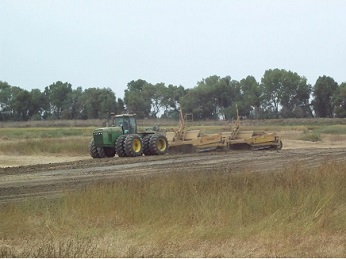Wetland Conservation Program
Support Funds for Wetland Wildlife Areas
The Wetland Conservation Program (WCP) administers $1.5 million in support funds to CDFW's 14 major wetland wildlife areas. One of the most important functions of the WCP is to ensure that funds made available through the Public Resources Account (PRA) are expended in a manner consistent with the enabling legislation and that these funds are directed to areas of demonstrated need which will result in the maximum benefit to wetland resources. The vast majority of the support funds are used to purchase water from irrigation districts or power to use pumps and wells for wetland flooding; improve or replace water distribution facilities; acquire seed, cuttings, or potted plants for restoration activities; control noxious weeds; and other activities needed to maintain diverse wetland ecosystems.
Wetland Restoration and Enhancement Projects
 Levee construction as part of a wetland restoration project in Merced County
Levee construction as part of a wetland restoration project in Merced County
The WCP expends approximately $500,000 per year of wetland capital outlay funds to restore and enhance wetlands on CDFW's lands. These projects construct water distribution systems to allow managers to mimic natural wetland hydrology; contour previously leveled lands to provide diverse water depths, channels, swales, and islands; and restore natural vegetation.
Nesting Bird Habitat Incentive Program
The Nesting Bird Habitat Incentive Program’s (NBHIP) Public Land Program is designed to provide assistance to state Wildlife Areas and National Wildlife Refuges to improve the quantity and quality of upland habitats for the benefit of nesting waterfowl, game birds and pollinators. The public land programs complement a suite of private land programs that work with farmers, ranchers and wetland owners throughout the state to improve nesting benefits on their lands. The private land programs include incentives for Delayed Cereal Grain Harvest, Fallow Agriculture, Agricultural Corridors and Upland Management Agreements.
Public land projects funded within this program may include the cultivation or retention of upland cover such as annual nesting cover, perennial native grasses and forbs or management activities to improve perennial grass habitats by managing noxious weeds and other undesirable plants. Any project that is funded by NBHIP will be required to leave the upland cover habitat unmanipulated (e.g., no discing, spraying herbicides, mowing, chopping, or rolling of vegetation) during the nesting season (April 1 – July 15). Furthermore, to be selected all projects must provide and maintain summer water habitats within one mile of the enhancement areas.